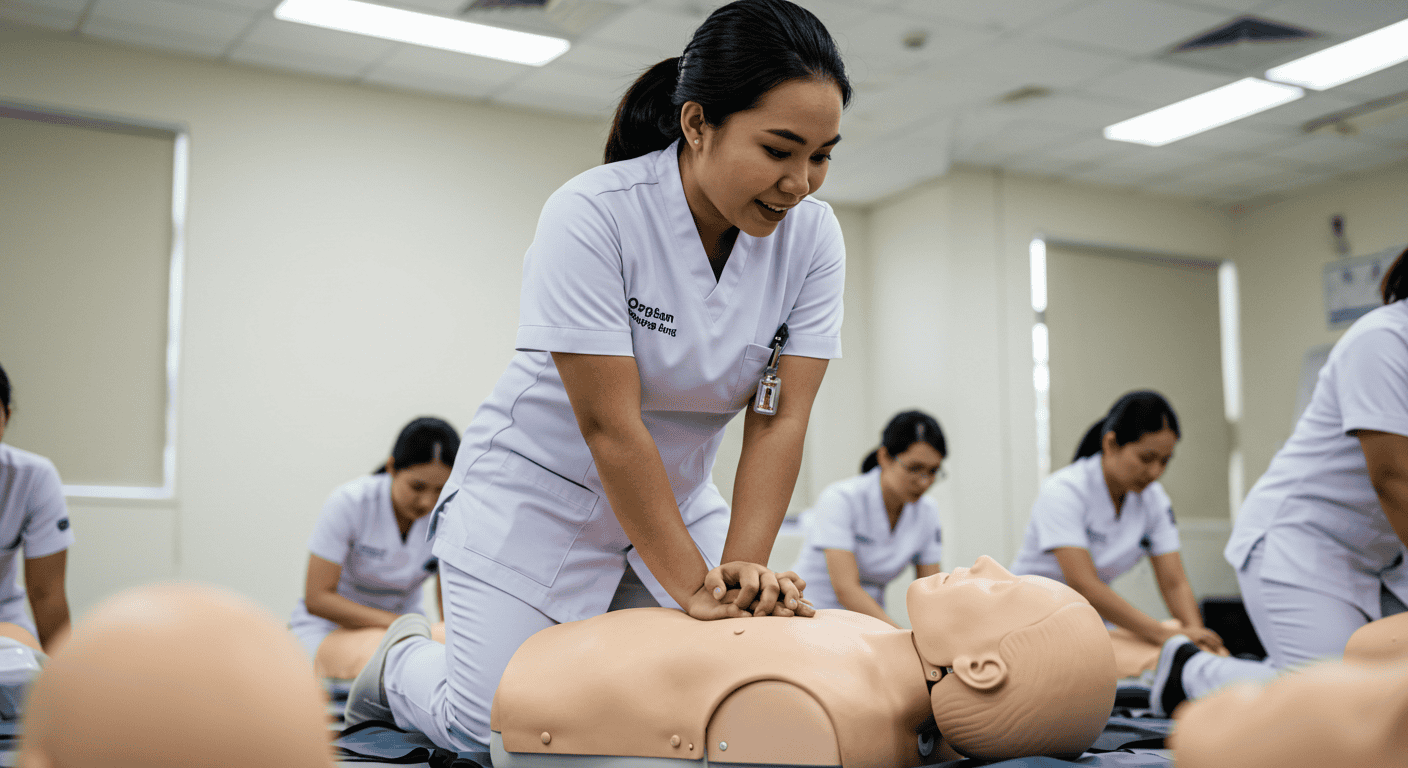First aid training in Malaysia focuses on developing essential life-saving skills while adhering to guidelines set by the Malaysian Red Crescent Society and Department of Occupational Safety and Health (DOSH). The training emphasizes practical emergency response skills suitable for workplace and community settings within Malaysian environments.
The program incorporates local emergency response protocols, an understanding of the healthcare system, and cultural considerations specific to Malaysian contexts. Training includes certification recognized by Malaysian authorities and meets workplace safety requirements under the Occupational Safety and Health Act 1994.
First Aid Course in Malaysia
Who Should Attend First Aid Training?
Safety and health officers, designated workplace first aiders, security personnel, teachers, childcare providers, and any individuals responsible for others’ safety should attend first aid training. This includes mandatory workplace first-aiders and those seeking voluntary certification for personal development.
The training is particularly crucial for professionals in high-risk industries, sports facilities, educational institutions, and public-facing roles where emergency response capabilities are essential.
What Are The Core First Aid Skills Covered?
The training addresses essential life-saving techniques, including CPR (Cardiopulmonary Resuscitation), wound management, fracture handling, and choking response. Participants learn adult and pediatric first aid techniques following Malaysian and international guidelines.
Special emphasis is placed on practical skills development through hands-on practice with mannequins and simulation exercises, ensuring participants can respond effectively in real emergencies.
How Are Emergency Response Protocols Addressed?
Participants learn Malaysian emergency response protocols, including activating local emergency services, properly communicating with medical professionals, and understanding the healthcare referral system. Training also covers coordination with ambulance services and hospital emergency departments.
The program includes understanding local emergency contact numbers, communication procedures, and proper documentation requirements for incident reporting.
What Workplace First Aid Requirements Are Covered?
The training addresses specific workplace first aid requirements under Malaysian regulations, including first aid kit maintenance, incident recording, and workplace emergency response planning. Participants learn about employer obligations and first-aider responsibilities.
Special focus is on industry-specific first aid requirements, risk assessment, and compliance with DOSH guidelines for different workplace settings.
How Is First Aid For Common Medical Conditions Handled?
Participants learn to recognize and respond to common medical conditions in Malaysian contexts, including diabetes, hypertension, asthma, and heat-related illnesses. Training covers both immediate response and ongoing care until medical help arrives.
The program includes understanding cultural considerations in providing first aid and managing medical emergencies within Malaysian communities.
What Tropical Climate Considerations Are Included?
Training addresses first aid responses specific to Malaysia’s tropical climate, including heat exhaustion, dehydration, and tropical disease-related emergencies. Participants learn to identify and manage climate-related health risks common in Malaysian environments.
Special attention is given to prevention strategies and appropriate first aid measures for tropical conditions affecting indoor and outdoor workplaces.
How Is Trauma Management Covered?
Training includes comprehensive trauma management skills, including bleeding control, burn treatment, and injury assessment following Malaysian first aid protocols. Participants learn proper techniques for bandaging, immobilization, and casualty handling.
The program emphasizes practical skills in managing everyday workplace and household injuries while considering available medical resources in Malaysian settings.
What Mental Health First Aid Is Addressed?
Participants learn basic mental health first aid skills, including recognizing signs of distress, providing initial support, and understanding referral pathways within Malaysian mental health services. The training also covers cultural sensitivity in mental health response.
Special focus is on workplace mental health support and crisis intervention techniques appropriate for Malaysian cultural contexts.
How Is First Aid Documentation Managed?
Training covers proper documentation requirements for first aid incidents in Malaysian contexts, including incident reports, treatment records, and legal considerations. Participants learn appropriate record-keeping practices for workplace first-aid situations.
The program includes understanding confidentiality requirements, medical documentation standards, and reporting procedures required by Malaysian authorities.
What Emergency Equipment Training Is Provided?
Participants learn to use and maintain various first aid equipment common in Malaysian settings, including AED (Automated External Defibrillator) devices, first aid kits, and emergency response equipment. Training covers equipment checks and maintenance requirements.
Special attention is given to understanding equipment standards, storage requirements, and proper usage protocols following Malaysian guidelines.
How Is Certification And Recertification Handled?
Training includes certification processes recognized by Malaysian authorities, with clear skill maintenance and recertification pathways. Participants learn about certification validity periods and continuing education requirements.
The program covers requirements for maintaining first aid qualifications, including refresher courses and skill updates according to Malaysian certification standards.

